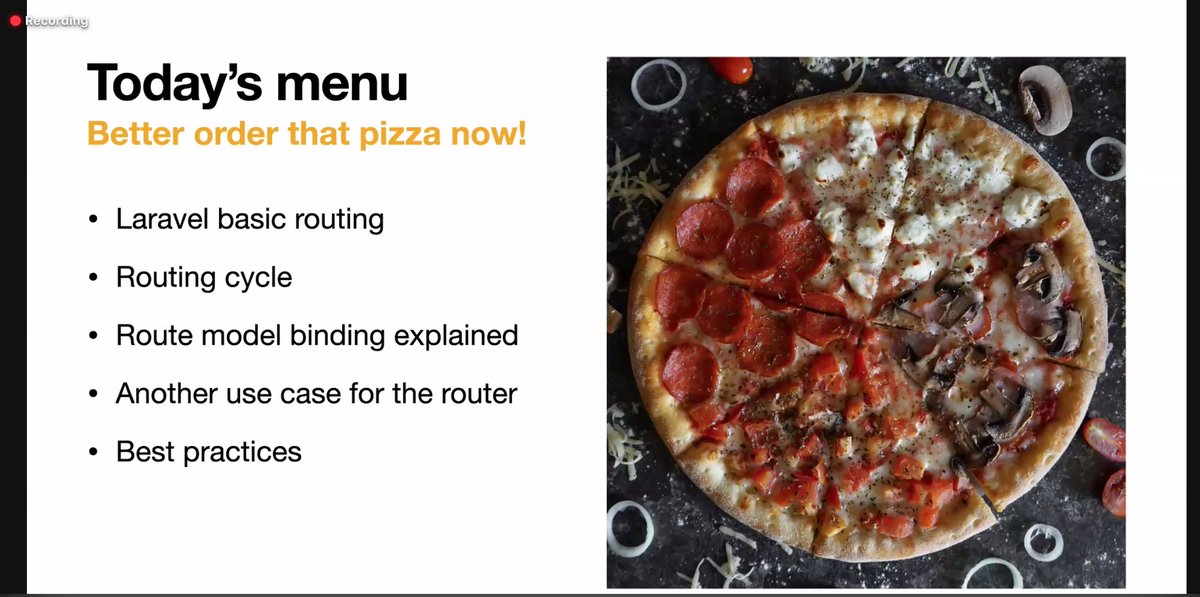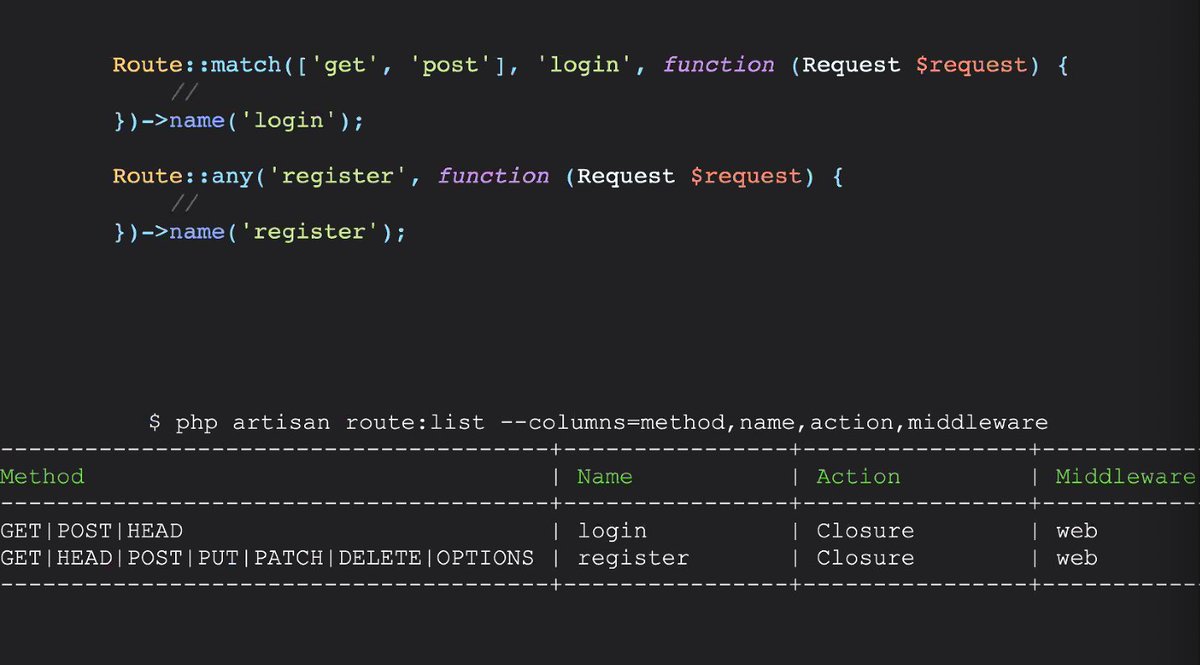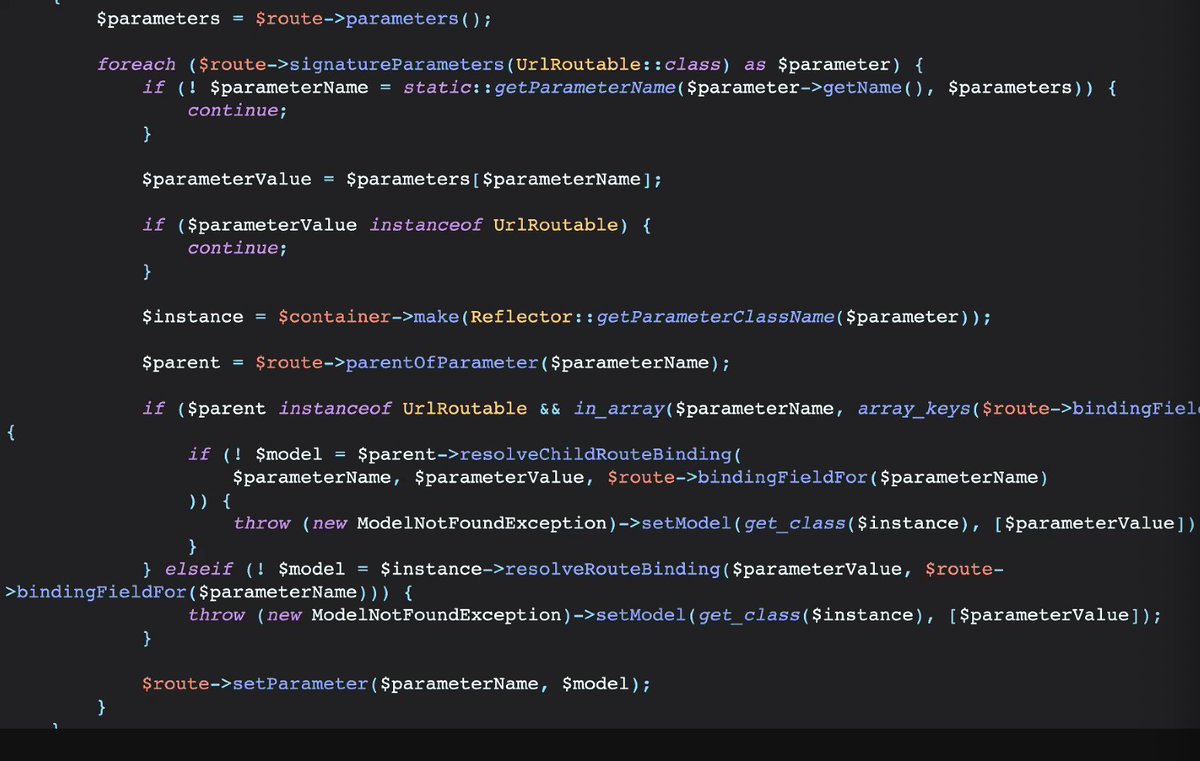
Different options in Laravel to register routes.
Multiple routes for "one" resource.
Different HTTP methods available. We can reuse same URI but with different methods.
route:list command output
with --compact option


Multiple routes for "one" resource.
Different HTTP methods available. We can reuse same URI but with different methods.
route:list command output
with --compact option

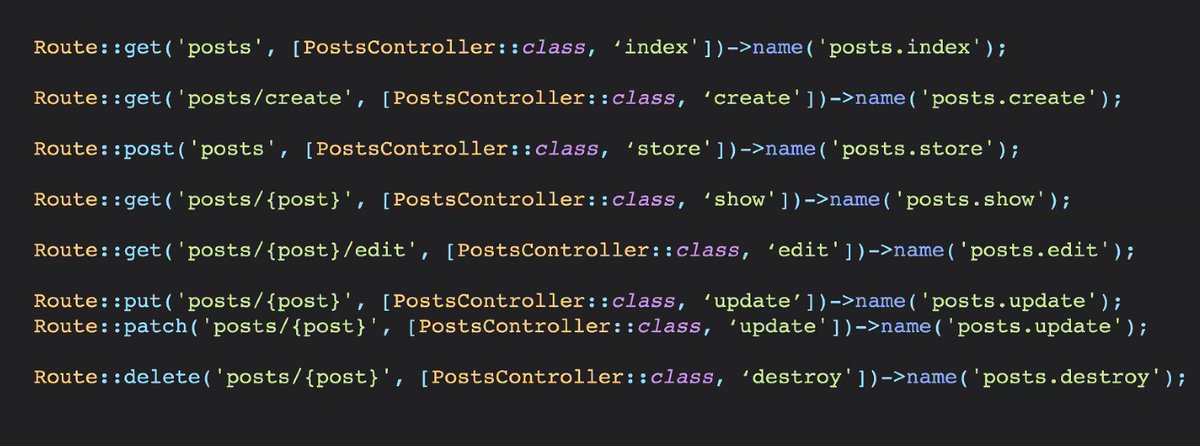

Route::resource() method. It is a time saver but its also PITA if you need fewer methods/routes from it. 

There's also a way to handle with above situation using only() and except() methods.
Downside of this method is if you want to see all the routes, you will need to run route:list command. You can't tell by looking at Route::resource in web.php file

Downside of this method is if you want to see all the routes, you will need to run route:list command. You can't tell by looking at Route::resource in web.php file


Other options like prefix, middleware, domain. You can also put these in a group so the options apply to all routes in a group.
Groups can also be nested. New groups with different conditions.
route:list command also accepts options to display on the table.



Groups can also be nested. New groups with different conditions.
route:list command also accepts options to display on the table.




Every route has a middleware called web. But we didn't apply it anywhere inside web.php file.
RouteServiceProvider located in app/Providers.
In previous versions ( <8) of Laravel ) we needed to provide $namespace property on provider.
boot method applies 'web' middleware.



RouteServiceProvider located in app/Providers.
In previous versions ( <8) of Laravel ) we needed to provide $namespace property on provider.
boot method applies 'web' middleware.




Route::redirect() and Route::permanentRedirect()
These are handled by RoutingController , woah, didn't know this.
Route::view() is also handled by a Controller.
Route::fallback() method can be used to provide a fallback url if none route matches. It should be at the end.

These are handled by RoutingController , woah, didn't know this.
Route::view() is also handled by a Controller.
Route::fallback() method can be used to provide a fallback url if none route matches. It should be at the end.


Route names
You can change the URI but since the name is still. same you don't need to change it everywhere else.
Pass arguments to route() helper method when using route names.
Adding extra parameters "will break" the route.
redirect to certain route using its name



You can change the URI but since the name is still. same you don't need to change it everywhere else.
Pass arguments to route() helper method when using route names.
Adding extra parameters "will break" the route.
redirect to certain route using its name




Route::current()
Route::currentRouteName();
Route::currentRouteAction();
Some other helpful methods on Route class.
Route::currentRouteName();
Route::currentRouteAction();
Some other helpful methods on Route class.

First file that request touches is index.php,
From there it goes to Kernel.php
Some middlewares are being registered.
First array of middlewares are applied on all requests.
middlewareGroups apply on grouped routes.


From there it goes to Kernel.php
Some middlewares are being registered.
First array of middlewares are applied on all requests.
middlewareGroups apply on grouped routes.

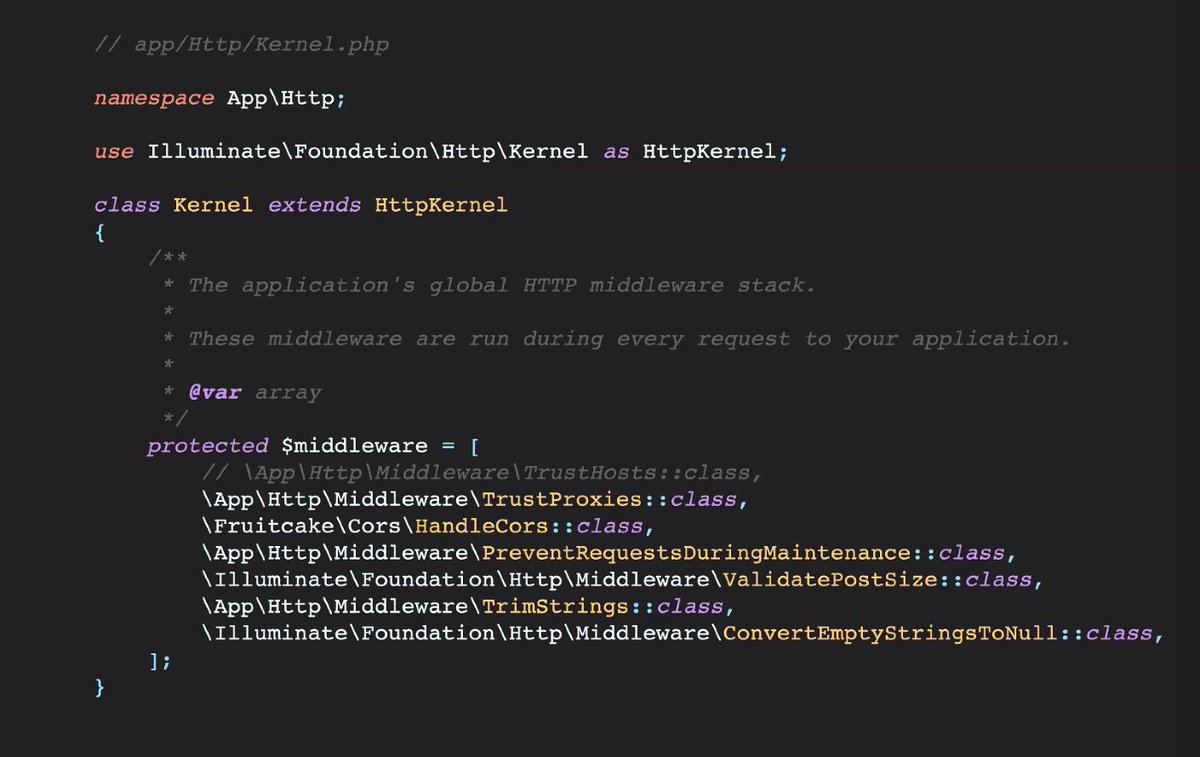

Looking handle method of HttpKernel inside laravel/framework.
handle method does one thing, send response to request.
First sendRequestThroughRouter
Resolve 'request' and then call $this->bootstrap()
Part of booting, RouteServiceProvider is booted and routes() method is calld


handle method does one thing, send response to request.
First sendRequestThroughRouter
Resolve 'request' and then call $this->bootstrap()
Part of booting, RouteServiceProvider is booted and routes() method is calld



If routesAreCached using the route:cache command, load all the routes from there. Otherwise load the routes.
Digging more into loadRoutes()
It will call all those methods when we do $this->app->call
Generic action for all routes in las screenshot.



Digging more into loadRoutes()
It will call all those methods when we do $this->app->call
Generic action for all routes in las screenshot.
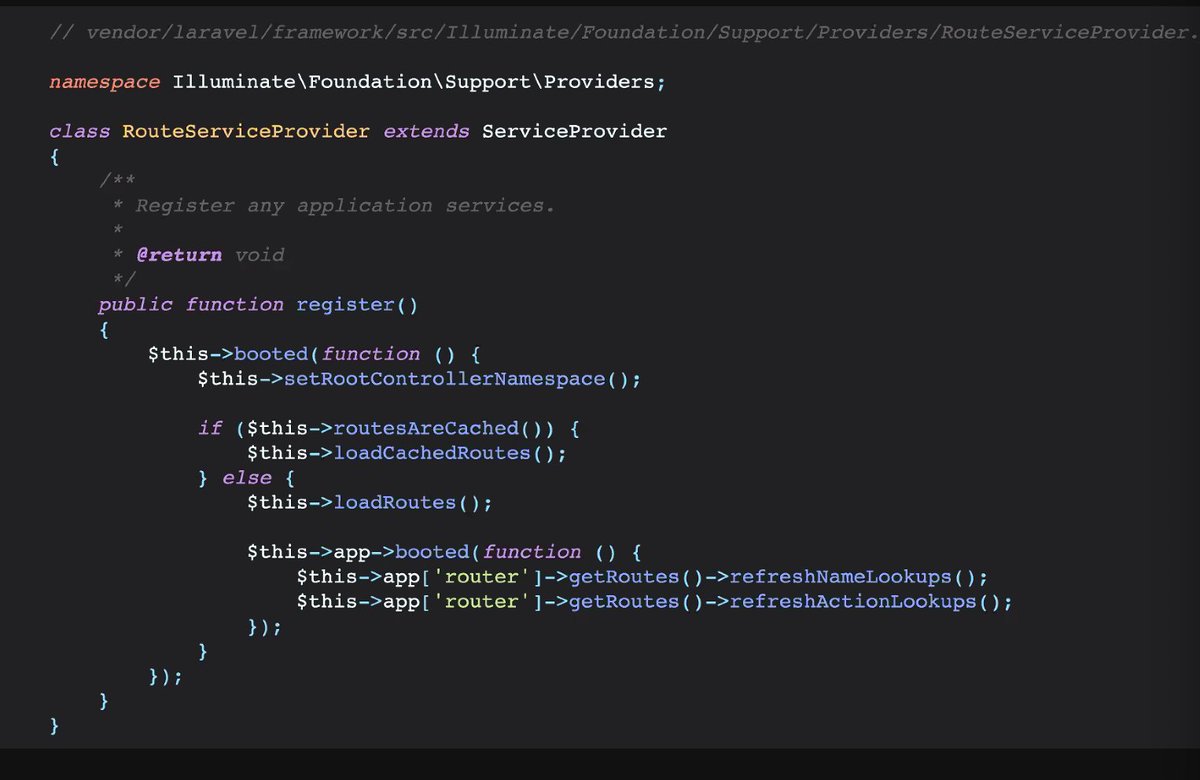


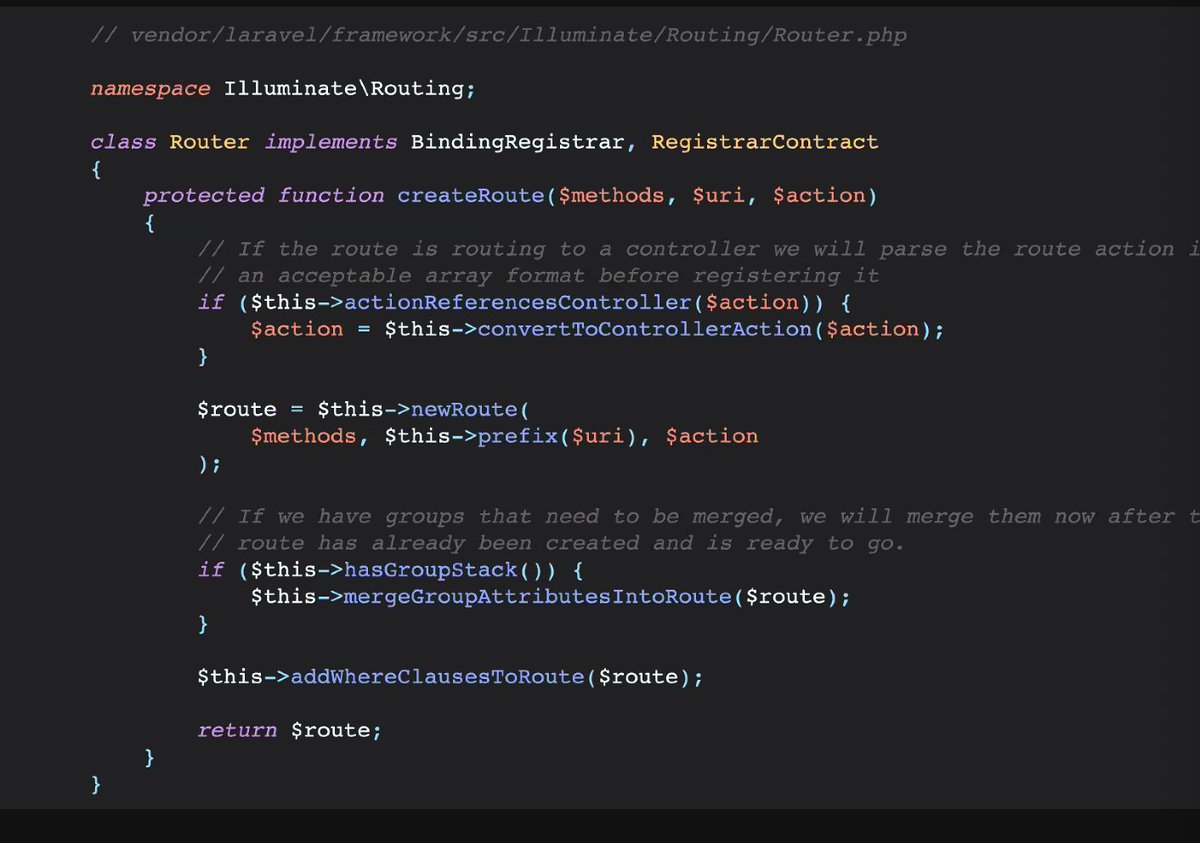
where statements can be seen being applied at the end.
prefixes are being applied.
Now that routes are loaded, last method calls to refreshNameLookups register the name of routes and also a method for Actions.


prefixes are being applied.
Now that routes are loaded, last method calls to refreshNameLookups register the name of routes and also a method for Actions.



Next is the Pipeline ( interesting stuff )
Request is being passed through middlewares.
Request is being bind again in dispatchToRouter as it has been modified.
We first findRoute and then runRoute
match() method gives the first route that matches.



Request is being passed through middlewares.
Request is being bind again in dispatchToRouter as it has been modified.
We first findRoute and then runRoute
match() method gives the first route that matches.




matchAgainstRoutes() method, which loops over all routes and checks for fallback first.
Laravel routing depends on SymfonyRoute which at the end finds the "route".
Damn, that's a lot of things happening. Hard to keep up 😂


Laravel routing depends on SymfonyRoute which at the end finds the "route".
Damn, that's a lot of things happening. Hard to keep up 😂



First we bind current request to route. NotFoundHttpException if route is not found.
if we found the route, we put it in Container.
Then we go to runRoute() after that runRouteWithinStack , "onion" instance.
That's a lot of layers.



if we found the route, we put it in Container.
Then we go to runRoute() after that runRouteWithinStack , "onion" instance.
That's a lot of layers.




prepareResponse method is responsible for preparing the response that needs to be sent.
That's a lot happening in `toResponse()` method ... :mind_blow:

That's a lot happening in `toResponse()` method ... :mind_blow:

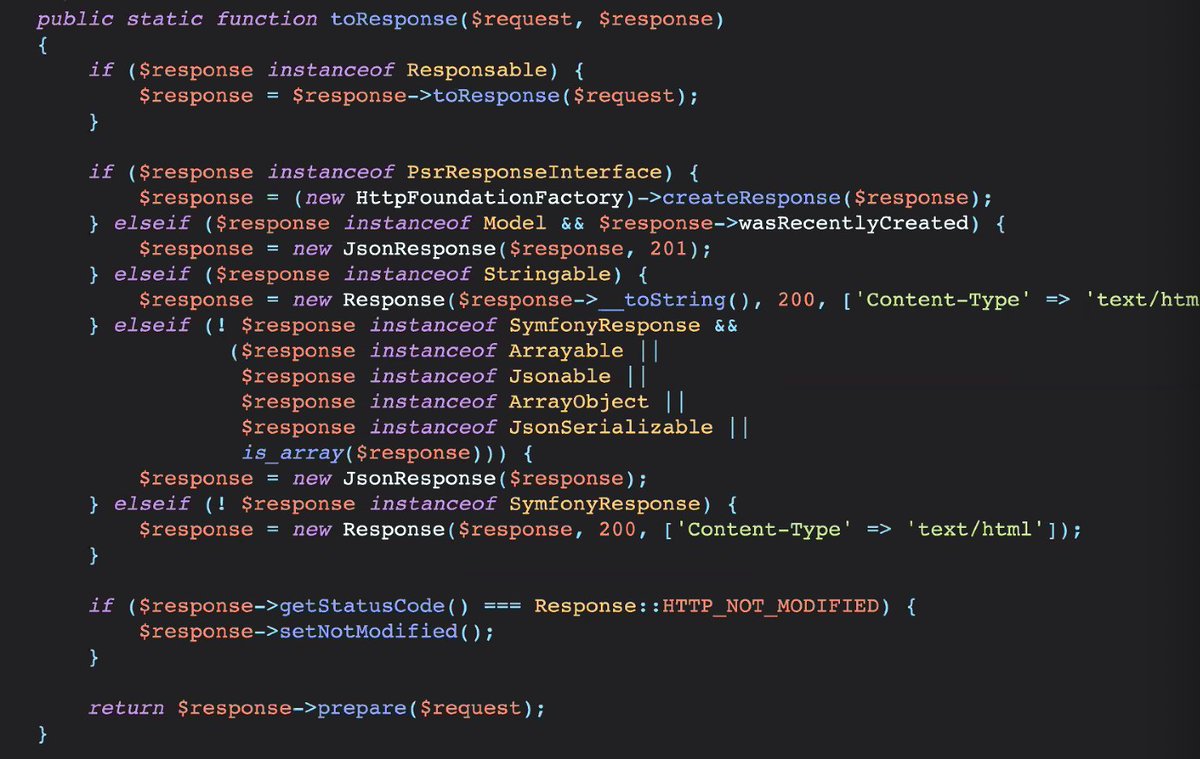
RequestHandled event. You can use it do something you want like, how many Requests handled by your app. 
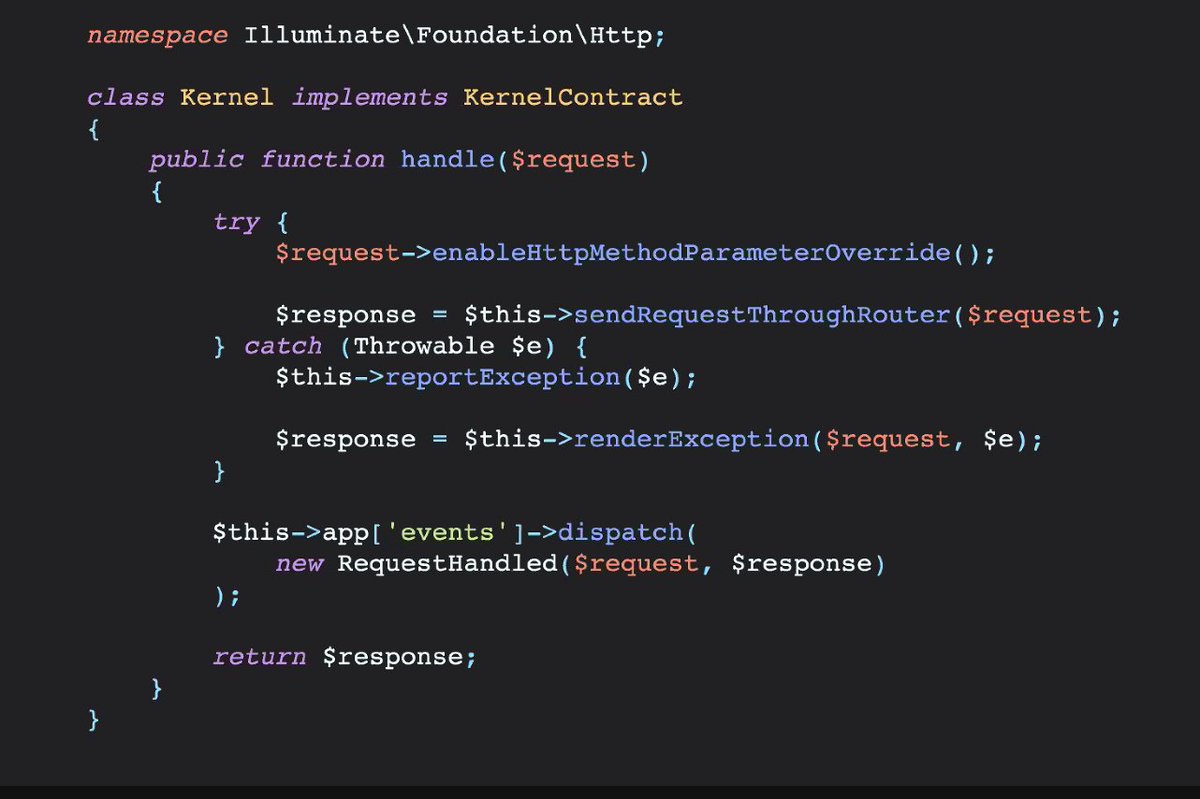
Route Model Binding.
@bobbybouwmann really miss Airpots I think 😅
if we don't type-hint in the route, Laravel wouldn't know.
Then we have ->where conditions in our rates.
Some extra methods like whereUuid, whereAlphaNumeric on Route class.



@bobbybouwmann really miss Airpots I think 😅
if we don't type-hint in the route, Laravel wouldn't know.
Then we have ->where conditions in our rates.
Some extra methods like whereUuid, whereAlphaNumeric on Route class.

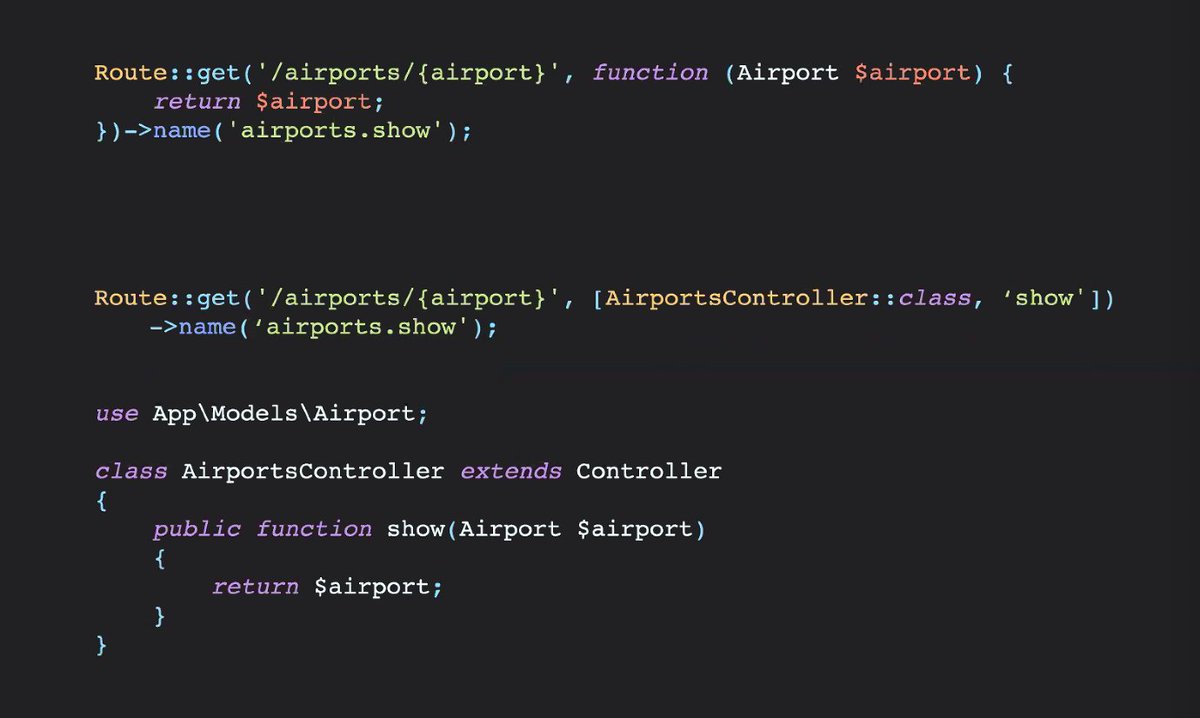
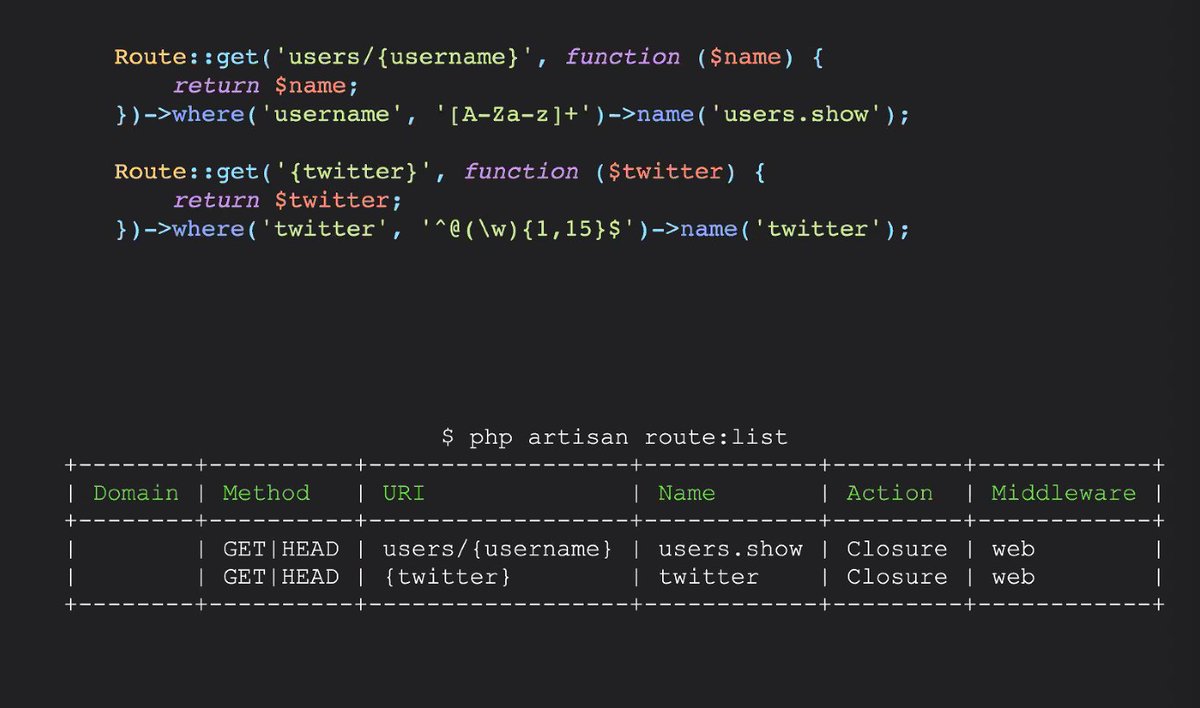

Route::missing() callback
DID NOT KNOW ABOUT IT.
Specify column name which should be queried for Route Model Binding.
We can specify queries inside RouteServiceProvider for Route Model Binding Query.



DID NOT KNOW ABOUT IT.
Specify column name which should be queried for Route Model Binding.
We can specify queries inside RouteServiceProvider for Route Model Binding Query.




RouteBinding forModel() method.
Explicit Binding first and then Implicit Binding.
What goes on inside Implicit Binding and RouteSignatureParameters.
Laravel uses Reflection to grab all parameters and what params are potentially models and if they should be retreived from DB.



Explicit Binding first and then Implicit Binding.
What goes on inside Implicit Binding and RouteSignatureParameters.
Laravel uses Reflection to grab all parameters and what params are potentially models and if they should be retreived from DB.




First we get the Controller class and method on it against the dispatch method of ControllerDispatcher.
Inside 'dispatch' method, all dependencies of Controller class and methods are resolved from Container.


Inside 'dispatch' method, all dependencies of Controller class and methods are resolved from Container.



We can use re-use logic from SymfonyRouter especially the "regex" part.
Magic happens in getRouteParametersForPattern
Compiling the Route and match the regex with certain parameters and return it.



Magic happens in getRouteParametersForPattern
Compiling the Route and match the regex with certain parameters and return it.
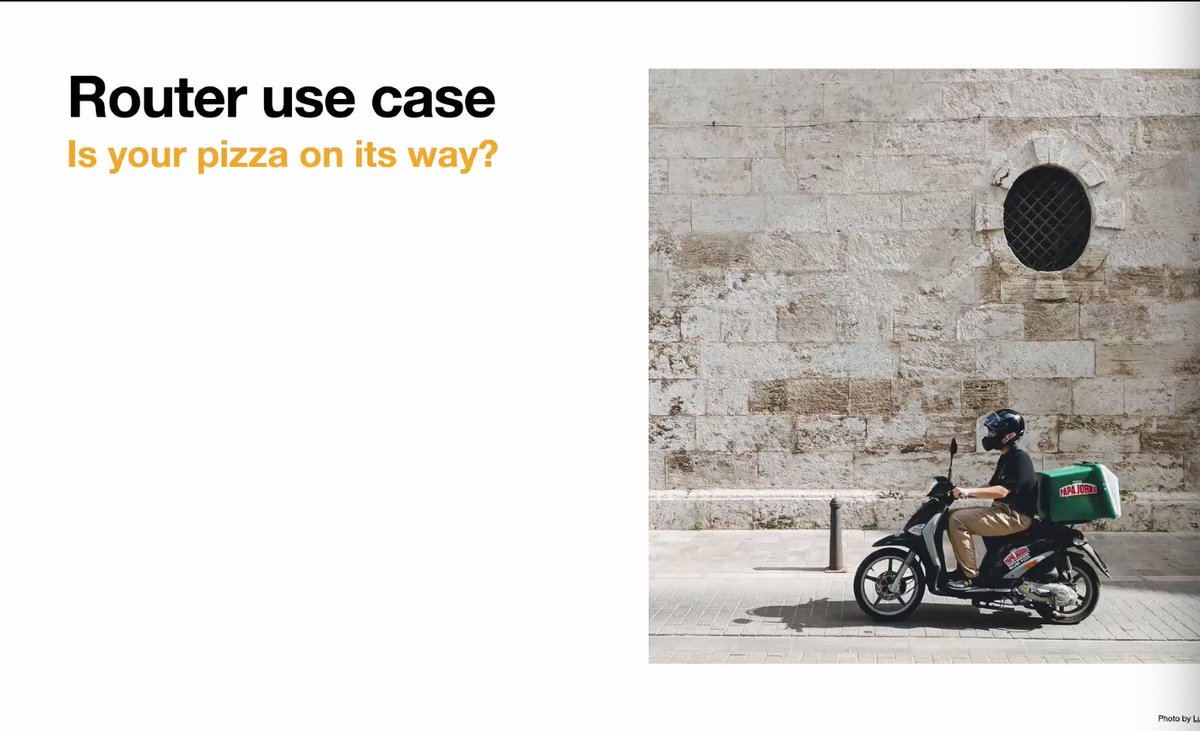



Some best practices about writing routes by @bobbybouwmann 



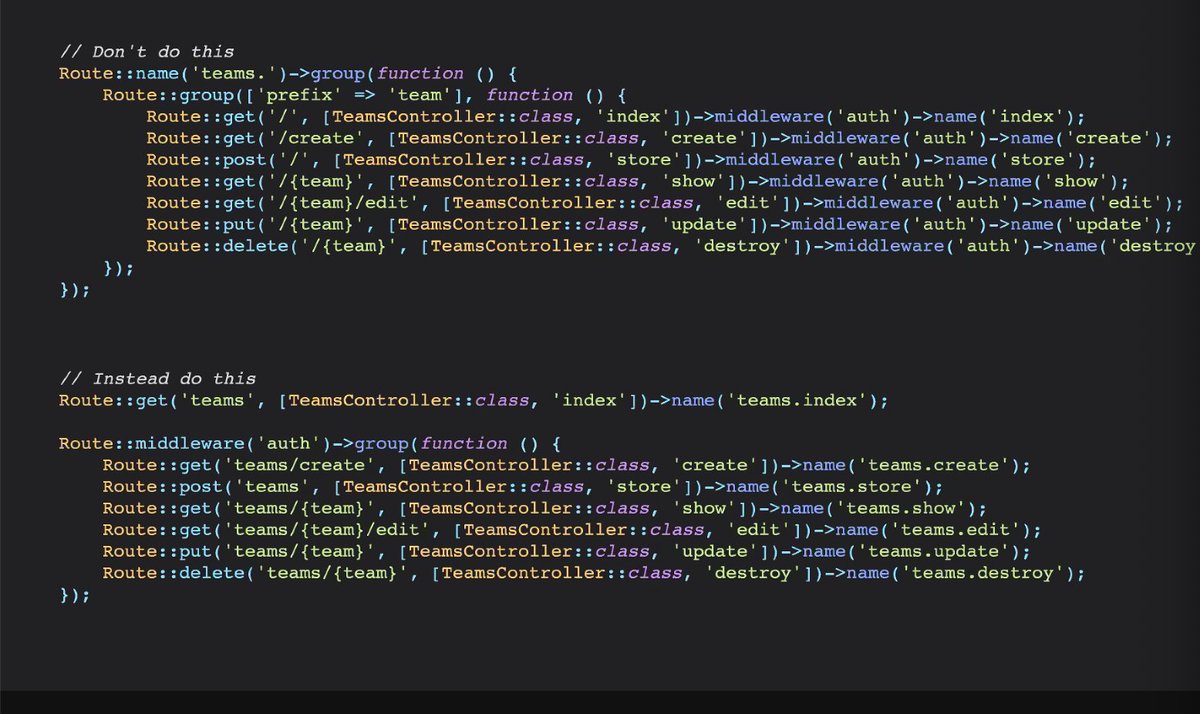

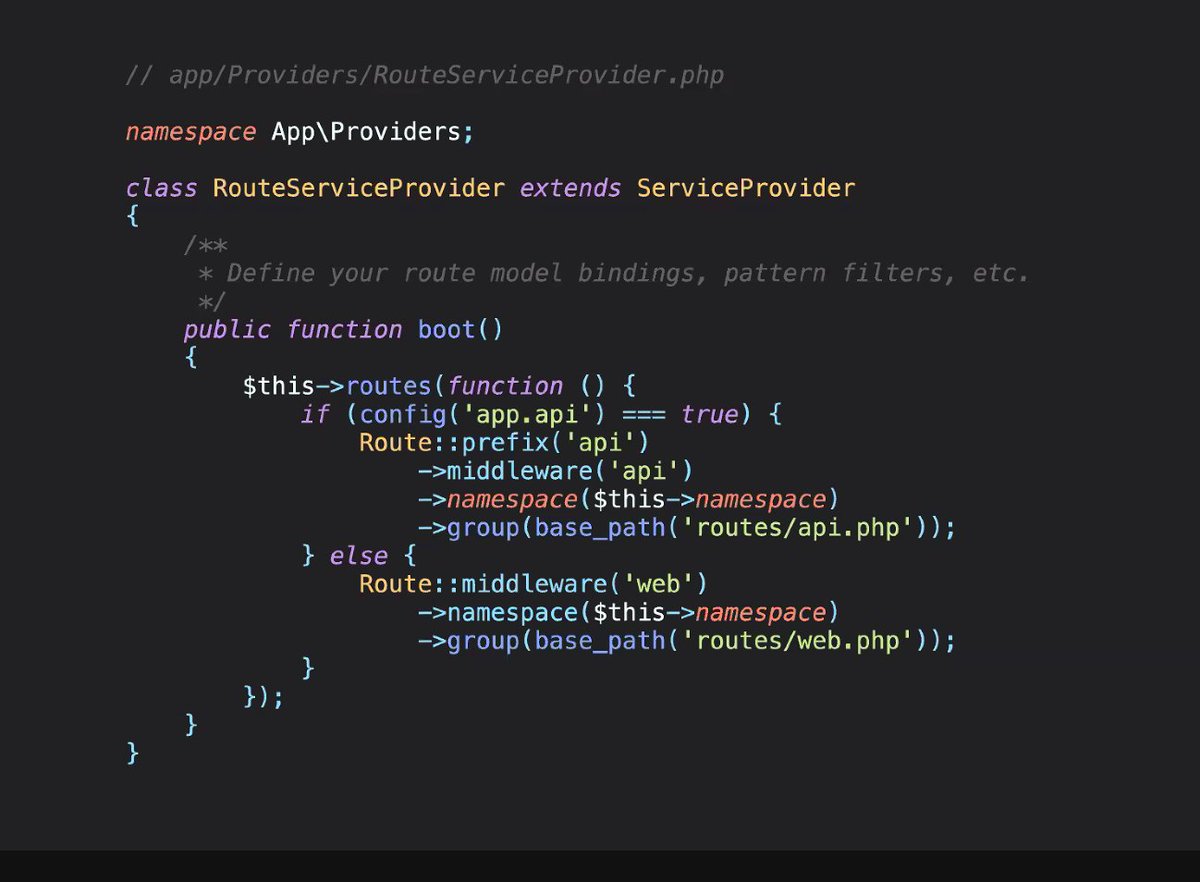

Best practices continued,
parameters based routes should be below.
use route caching in production, make sure you don't use it locally.

parameters based routes should be below.
use route caching in production, make sure you don't use it locally.


• • •
Missing some Tweet in this thread? You can try to
force a refresh

